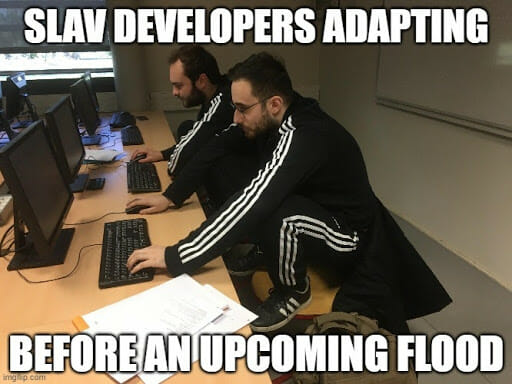5 Soft Skills Every Top Software Developer Should Master

Do you think you are worthy of being a top software developer?
Beware, my friend! Only extraordinary professionals, gifted with rare and excellent soft skills, will be able to extract the sword keyboard from the rock.
“Which soft skills?”, you asked.
Well, it’s difficult to choose, but we selected 5 which are absolutely essential in the IT industry:
- Communication
- Teamwork
- Negotiation
- Flexibility
- Creativity
Before diving into this list of ultimate nerdy superpowers, let’s start by defining what soft skills are and why they differ from so-called hard skills.
Software developers’ soft skills vs hard skills
In general terms, soft skills are strictly dependent on the mindset of a professional: their approach to work, values, the way of interacting with colleagues, and many other character traits that make us essentially who we are.
Can you handle an emergency situation with the proper coolness? Are you able to resolve conflicts with a bossy manager? Will you console your depressed co-worker who just got dumped by their partner and no longer seems able to code?
That’s a matter of soft skills.
What about hard skills?
On the other hand, hard skills are much easier to spot, quantify, and teach. They concern the ability to perform specific tasks on the basis of previously acquired knowledge.
Developing faster than the wind, knowing algorithms better than you know your mother, and being able to turn on a laptop are all hard skills. Maybe the last one isn’t that hard, actually.
However, the two skill classes often travel in parallel supporting each other. After all, a good attitude to teamwork, which can be categorized as soft skills, can greatly catalyze the learning of new hard skills.
At the same time, excellent technical knowledge can facilitate the overall workflow and thus contribute to a good collaboration and working environment.
The best IT soft skills
Soft skills are the kind of stuff you cannot learn on a business course. They depend on a person’s character, but also the experience gained during their career can certainly help to develop them.
Here are our 5 favorites:
1. Communication
Let’s be honest, the typical software developer stereotype has little to do with excellent communication skills. However, what distinguishes a sociopathic hacker from a high-level IT professional is the ability to explain yourself.
Misunderstandings are the first step on the road to failure, whether they are among colleagues intent on choosing the best solutions to implement, or with customers not too used to technicalities.
Instead, good communication is the key to making your workflow smooth and clean, as well as avoiding a big headache for anyone not directly involved in the development process, such as account managers and clients.
2. Teamwork
If communication in the IT sector is so important nowadays it is also because almost all development projects are done in teams. And this brings us to the second determining factor in recognizing a great software developer.
Top professionals know how to work as a team: they can constructively discuss, support, and advise each other. They can also mentor their junior colleagues, helping them grow professionally and be autonomous faster.
Bust most importantly, great software developers do their best to maintain a healthy and pleasant work environment for everyone.
Unfortunately, such a character trait (as well as its opposite) is difficult to spot during a job interview. This entails the risk of hiring new developers who are unsuitable for teamwork and capable of breaking the fragile ecosystem within the company.
3. Negotiation
Even in the most close-knit and synergistic teams of IT professionals, the day of misunderstanding and discontent will come. It could be a question of solutions to choose from or features to implement or prioritize.
At that moment, what will determine the success or failure of a project will be the ability of individual members to carry a bigger knife negotiate, compromise, listen to other people’s opinions and reconcile different ideas.
This requires a good deal of diplomacy and respect towards the people who work with you, including your subordinates, and it’s essential in the software engineering community, where peer review is standard practice.
4. Flexibility
Information technology is a constantly changing sector, requiring the endless acquisition of new knowledge and skills, but also the implementation of innovative approaches and methodologies.
This means that those who cannot adapt are out of the game. Like the dinosaurs, who couldn’t even handle a large stone falling from the sky. Losers.
A great IT specialist should be flexible enough to embrace change. In practical terms, we talk about dealing with new and different technologies, architectures, software specifications, frameworks, and so on.
You know… each project will be different from the previous one and the ability to adapt to the ever-evolving IT market is a fundamental element to distinguish the amateur from the elite software developer.

5. Creativity
Did I mention that software developers should be flexible and ready for new things?
Yes, I did it. And one feature that can help them a lot in this regard is creativity. An excellent IT specialist should be able to think outside the box, to go beyond simple standard procedures.
Of course, software development involves numerous repetitive and, in some ways, trivial tasks. But it is also a job that requires making many choices, working out alternative solutions, and dealing with unexpected problems.
Something that the most creative and original professionals may be able to do better than those who think according to preconceptions and within their own ideological boundaries.
Do we need soft skills more than ever?
Developing is dirty work, but someone has to do it. If that someone is you, or if you are a recruiter looking for young blood to hire, paying proper attention to the skills mentioned above will be the quickest route to great results.
At this point, however, you may be wondering whether it’s reasonable to prioritize the soft skills category over the hard skills one.
Well, there is no single answer to this question, excluding the evergreen and subtle “all are important”. But we can spot a clear trend in recent years, that seems to be moving towards soft skills when it comes to selecting potential new IT talent.
What does the research say?
According to the Global Talent Trends research, published by LinkedIn in 2019 and based on a sample of 5,165 IT professionals, what employers want most today are soft skills.
In fact, 91% of companies cited this as a major problem, while 80% of companies said they were struggling to find better soft skills in the job market.
This shouldn’t surprise us too much. After all, hard skills can be taught and improved over time, while soft skills (such as communication and creativity) depend on a person’s disposition, which is something much more challenging to reforge.
Are you looking for IT specialists with greater social skills than a Japanese hikikomori? Do you desperately need cool developers with excellent technical skills, but who also know how to interact with other humans? Leave us a message, and we’ll definitely get back to you!
